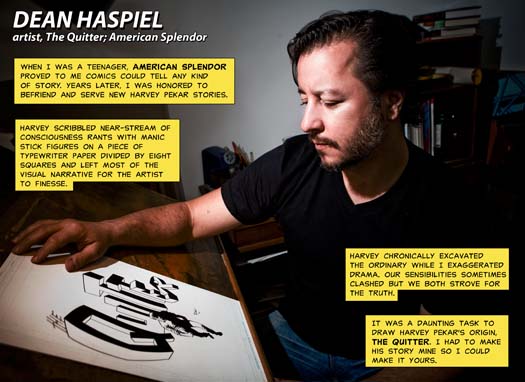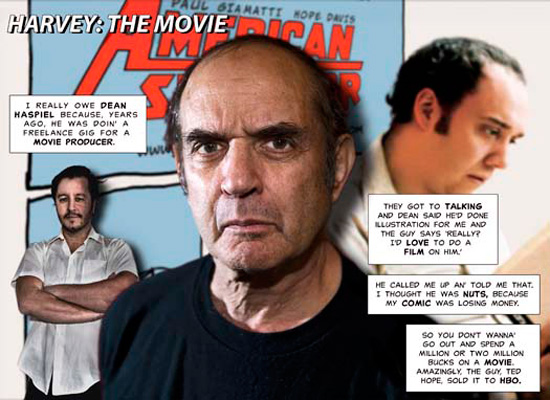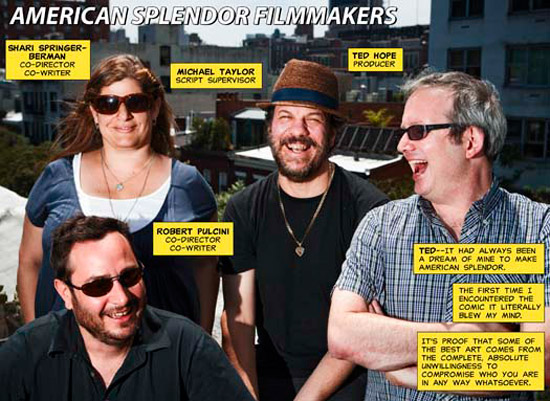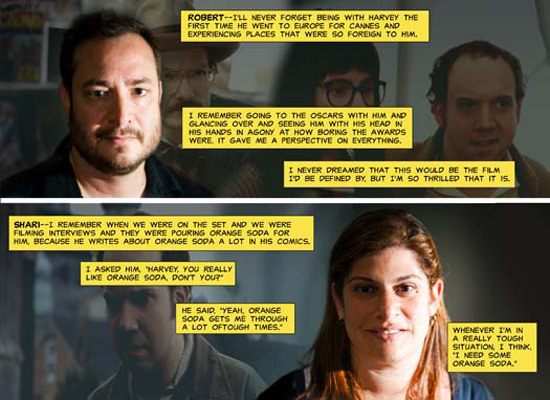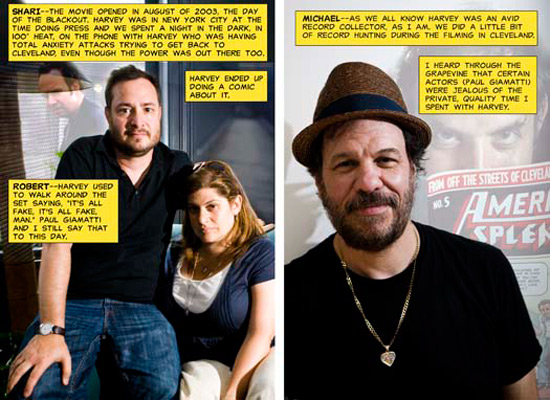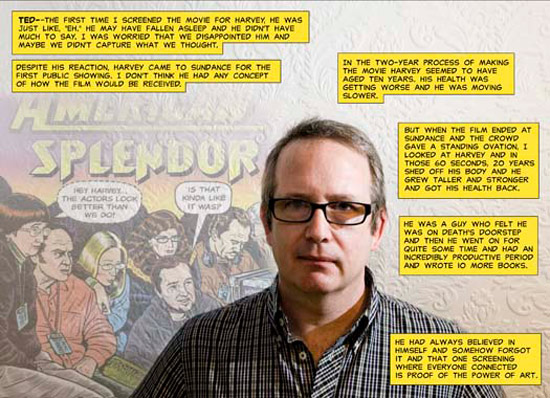Today’s Guest Post is by writer/director, Shari Springer Berman. I got to work with Shari and her partner Bob Pulcini on AMERICAN SPLENDOR, and recently had the pleasure of screening their new film THE EXTRA MAN, opening this weekend.
 When Ted approached me to write something about THE EXTRA MAN for his very cool website, I was honored but also at a loss. As I am pretty old school, I don’t have much experience with blogging and tweeting. I thought maybe I could use that to my advantage and write something about the golden age of indie film – a time when filmmakers like Jim Jarmusch, Todd Haynes and David Lynch were inspiring me to study cinema. I would examine how way back in the 80’s and early 90’s, alternative film folks would physically gather in places like the art house cinema, whereas now this community finds each other on websites like Truly Free. But what did this line of thought have to do with my new film? So I nixed that idea and then considered writing about the compromises, frustrations and joys of making a fairly ambitious film on a tiny budget. Unfortunately, we have all read that article before. I was stumped… Then Harvey Pekar sadly passed away last week and I found my inspiration. Of course, it wasn’t the first time I found inspiration from Harvey, and judging from the outpouring of love, condolences and abundant press I was not the only person who felt that way.
When Ted approached me to write something about THE EXTRA MAN for his very cool website, I was honored but also at a loss. As I am pretty old school, I don’t have much experience with blogging and tweeting. I thought maybe I could use that to my advantage and write something about the golden age of indie film – a time when filmmakers like Jim Jarmusch, Todd Haynes and David Lynch were inspiring me to study cinema. I would examine how way back in the 80’s and early 90’s, alternative film folks would physically gather in places like the art house cinema, whereas now this community finds each other on websites like Truly Free. But what did this line of thought have to do with my new film? So I nixed that idea and then considered writing about the compromises, frustrations and joys of making a fairly ambitious film on a tiny budget. Unfortunately, we have all read that article before. I was stumped… Then Harvey Pekar sadly passed away last week and I found my inspiration. Of course, it wasn’t the first time I found inspiration from Harvey, and judging from the outpouring of love, condolences and abundant press I was not the only person who felt that way.
Bob and I first met Harvey in 2000 after being asked to do a film adaptation of his landmark comic book series AMERICAN SPLENDOR by none other than Ted Hope himself. We were intrigued by the idea and loved the material, but Ted warned us we had to meet Harvey first before agreeing to do the film; Harvey was brilliant and fascinating but also a handful. So Bob and I flew out to Cleveland and stayed at the strangest hotel I have ever visited. It was Harvey’s recommendation. Once stately but now shabby, the hotel had peeling paint, bad mattresses and tons of character. It was also mostly populated with cancer patients who were undergoing chemotherapy at the Cleveland Clinic. The lobby was crowded with people pushing IV stands. Harvey later told us that Cole Porter wrote NIGHT AND DAY in the ballroom that was sitting unused on the top floor. As we soon discovered, the hotel was quintessential Harvey – strange, depressing, magnificent, genuine and all accompanied by a great soundtrack.
Of course, we totally connected with Harvey on that trip. He was the very definition of a working class intellectual and was one of the smartest people I have ever met, not to mention a true artist. Although he might have seemed incredibly down to earth, the truth is he desperately craved recognition. In spite of his everyman persona, Harvey longed for his work to gain broad appeal, and he was very excited about being the subject of a feature film. He was also very into getting paid lots of “bread.” He still spoke beatnik. During our hectic 24 day shoot, he would show up to the set every day around lunch for free food, good conversation and a nap. There was one insane meta-moment when Harvey actually fell asleep on the prop couch in his set apartment as the electrics were lighting around him. Everyone loved his visits. He inspired us all to do our best work even under the craziest conditions.
Traveling to Sundance, Cannes and the Academy Awards with Harvey, Joyce and Danielle were some of the most memorable experiences of my life. He was captivating in front of any crowd and could go from kvetching to charming in a split second. He was more impressed with the laundering services in his Cannes hotel than he was with the red carpet on the Croisette. He was totally bored at the Oscars and was proud to announce that his tuxedo was courtesy of Tuxedo Junction in Cleveland. During the blackout of 2003 (which apocalyptically happened on SPLENDOR’S opening night in 4 of the 5 cities we were playing in), Harvey was trapped in a midtown Manhattan hotel room. He obsessively wanted to get back to Cleveland but instead wrote a brilliant comic about his blackout experience that we used as a NEW YORK TIMES ad the following week.
We last saw Harvey for lunch a few months ago and he looked fantastic. He was busy working on lots of new projects and was in great spirits. When he asked what we were working on, we told him about THE EXTRA MAN. It turned out he had read the book (of course) and loved it. And that got me to thinking that Harvey Pekar is a lot like Henry Harrison, the character Jonathan Ames created that Kevin Kline plays in our most recent film. On the surface they are very different, as Henry is an escort to elderly society ladies in New York and Harvey escorted the likes of Toby Radloff around Cleveland. But they really do have a lot in common. They are philosophers, outsiders and true originals. They are complicated and crabby and authentic and captivating all at the same time. Henry is as deeply flawed as Harvey and thus, so much more human and real. Neither is always likeable or sympathetic in the Hollywood sense, but one could never argue that they aren’t interesting. And this is perhaps the very essence of independent cinema. In AMERICAN SPLENDOR, Harvey says, “Ordinary life is pretty complex stuff.” Why shouldn’t movies be the same?
Shari Springer Berman is the Oscar-nominated co-screenwriter / co-filmmaker of the critically acclaimed film, American Splendor. In 2007, Berman and Pulcini adapted and directed the international best-seller THE NANNY DIARIES, staring Scarlett Johansson. Their third narrative feature, THE EXTRA MAN, starring Kevin Kline, Paul Dano and Katie Holmes will be released this summer. They are currently in production on their latest film, CINEMA VERITE.



